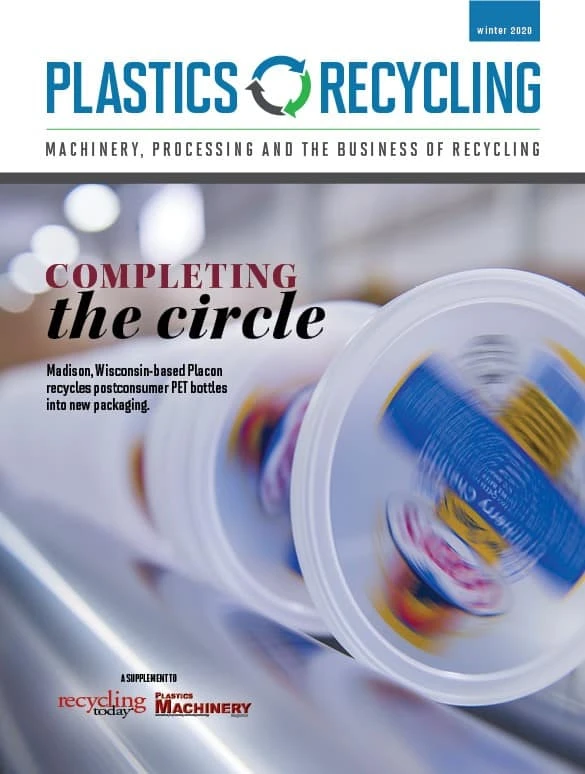Gary Welsh first developed his appreciation for plastics during his time working for Dow Chemical Co. as part of a co-op program when he was studying chemical engineering at the University of Cincinnati. Following his graduation, Welsh applied for a full-time position with Dow. An article titled “Workforce stories” in the Fall 2018 issue of Plastics Magazine, a publication of the Plastics Industry Association, shares Welsh’s memory of being intrigued by a display in the company’s lobby that showcased objects made from plastics. He told the publication, “Seeing the huge number of plastics applications truly impacted me.”
Welsh spent 30 years working for Dow before taking a position with Americas Styrenics LLC, also known as AmSty, which is headquartered in The Woodlands, Texas. He joined that company in May 2008, when it was established.
Welsh serves as AmSty’s senior technical service and development leader. He helped the company develop its PolyUsable technology, which transforms polystyrene (PS) back into its basic monomers to be repolymerized and reused without degradation. AmSty and Tigard, Oregon-based Agilyx have formed a joint venture, Regenyx, to bring the PolyUsable process to market, assuring PS remains a viable and growing component of the circular economy, the companies say.
In the following interview, Welsh shares his perspectives on plastics, sustainability and the developments he’s had a role in throughout his career.
How has the plastics industry and plastics recycling changed over the years? There is a greater recognition of the value of plastics and end-of-life issues.
Where do you see opportunities for plastics recycling? What about challenges? Mechanical recycling has played an important role in plastics recycling, but, in many cases, the mechanically recycled polymers are opaque and have decreased physical properties compared with the virgin polymers.
Recently, chemically recycled polymers have overcome these limitations by processing the plastics back to their monomers and repolymerizing. The chemically recycled polymers have all of the features of the virgin polymers, which greatly increases their suitability for end-use markets.
What misperceptions about plastics do you wish you could debunk? I believe there is a personal responsibility for all citizens to play a stronger role in product selection and waste disposal in the sense of sustainability. There are better ways to manage plastic waste than banning materials from common use.
How important to you are concerns about “greenwashing”—environmental claims that don’t hold up? This is a major issue. Trust and credibility in any industry are the most basic elements. Industry third-party certifications are becoming more common, which decreases greenwashing and creates an even playing field for all polymer producers and converters.
What professional accomplishment are you most proud of? My role in developing environmentally friendly blowing agents for foamed polymers, low taste/odor polymers for sensitive food packaging applications, polylactic acid biopolymers and high extensional viscosity polymers for lower density foams.
How have equipment vendors and technology helped to address the challenges the plastics recycling industry is facing? Over the last 40 years, significant improvements have been made in process control technology, allowing converters to run higher rates and process semicrystalline polymers with narrow processing windows. New extruder screw designs have improved melt quality and increased output rates.
What advice can you offer to younger people entering the industry? Plastics will be a critical part of our global economy because, for many applications, plastics are the best choice for cost/performance and life cycle analysis. New technology such as chemical recycling will further address end-of life-concerns and work toward a circular economy.
Who has served as your role model? After WWII, the polymer industry exploded with new technologies developed by some incredible engineers and scientists. In my early years at Dow, I had the pleasure to work with some of these titans in industry, truly standing on the shoulders of giants. Turner Alfrey, Bud Rubens and Bob Cramer were just a few of these pioneers.

Explore the Winter 2020 Plastics Recycling Issue
Check out more from this issue and find your next story to read.
Latest from Recycling Today
- Innovation in cable recycling: the MaX by MTB
- Step inside the Rumpke Recycling & Resource Center
- Ascend Elements alters Kentucky plans, will return $164M grant to DOE
- US plastic scrap imports reached record high in 2024
- Egypt soaks up European scrap: Navigate Commodities
- S. Norton hosts tour of shredder yard
- Tariffs prepare path for US metals production boost: Goldman Sachs
- PCA announces planned management changes





